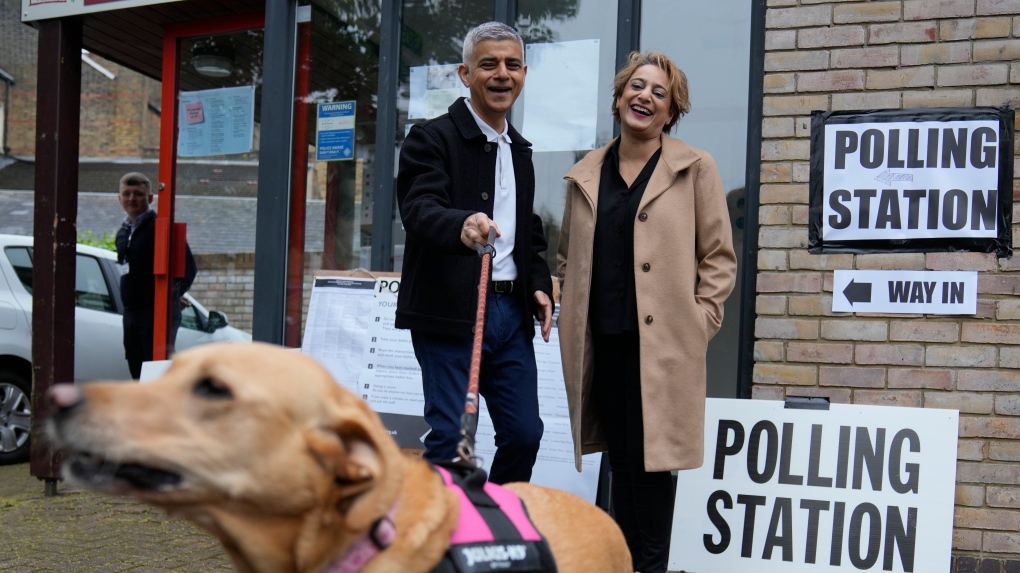LONDON –
Sadiq Khan, the Labour Party’s mayor of London, appeared Saturday to be romping to victory as results from the capital pour in.
Results from six of the 14 electoral districts show Khan, chasing a record third straight term at City Hall, edging near 50 per cent of the vote and more than 20 percentage points ahead of his main challenger, the Conservative Party’s Susan Hall.
There had been frenzied speculation on Friday that the result would be closer than previously thought, but Khan’s lead so far shows a swing from Conservative to Labour.
If confirmed later, it will be another positive sign for Labour from Thursday’s array of local elections that if repeated in a looming national vote in coming months will see the party oust the Conservatives from power for the first time since 2010.
“Sadiq Khan was absolutely the right candidate,” said Labour leader Keir Starmer. “He has got two terms of delivery behind him and I am confident that he has got another term of delivery in front of him.”
Labour has won control of councils in England that the party hasn’t held for decades, and was successful in a special election for a seat in Parliament. If those results are repeated in the general election, it would lead to one of the Conservatives’ biggest-ever defeats.
Though the Conservatives suffered a drubbing in the local elections, it looks like Prime Minister Rishi Sunak will not face a further rebellion among his ranks.
Sunak was able to breathe a sigh of relief when the Conservative mayor of Tees Valley in the northeast of England was reelected, albeit with a depressed share of the vote. Sunak will be hoping that Andy Street will also hold on in the West Midlands, especially in Birmingham.
One negative for Labour in the results was that its vote in strongly Muslim areas in England was depressed by opposition to the party leadership’s strong pro-Israel stance over the war in Gaza.
Starmer conceded that the party has had issues with Muslim voters, but the results in general were positive for the man who is favourite to become prime minister at the next general election.
He urged Sunak to call an election now. Sunak has the power to decide on the date, and has indicated that it will be in the second half of 2024.
“We’re fed up with your division, with your chaos, with your failure,” he said Saturday. “If you leave your country in a worse state than when you found it, 14 years later, you do not deserve to be in government a moment longer.”
Thursday’s elections in large parts of England were important in themselves, with voters deciding on who runs many aspects of their daily lives, such as garbage collection, road maintenance and local crime prevention. But with a national election looming, they are being viewed through a national prism.
John Curtice, professor of politics at the University of Strathclyde, said the results show that Sunak has not helped the Conservative brand following the damage accrued by the actions of his predecessors, Boris Johnson and then Liz Truss.
“That in a sense is the big takeaway,” he told BBC radio.
Sunak became prime minister in October 2022, after Truss’s short-lived tenure. She left office after 49 days following a budget of unfunded tax cuts that roiled financial markets and sent borrowing costs for homeowners surging.
Her chaotic — and traumatic — leadership compounded the Conservatives’ difficulties following the circus surrounding her predecessor Johnson, who was forced to quit after being adjudged to have lied to Parliament over coronavirus lockdown breaches at his offices in Downing Street.
By midafternoon Saturday, with most of the 2,661 seats up for grabs in the local elections counted, the Conservatives were down by more than 496 while Labour was up 174. Other parties, such as the centrist Liberal Democrats and the Green Party also made gains. Reform U.K., which is trying to usurp the Conservatives from the right, also had some successes, notably in Blackpool South, where it was less than 200 votes from grabbing second place.







